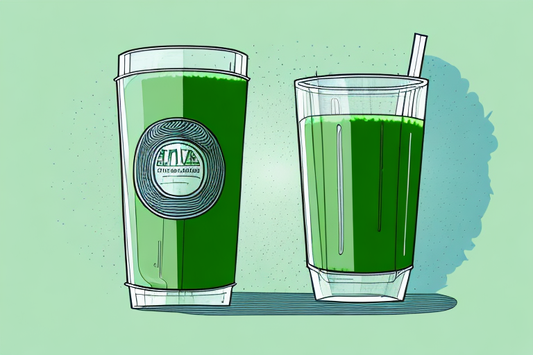
How alpha lipioc acid helps you beat nueropathy: A Scientific look
Neuropathy is a nerve disease that can cause pain, tingling, and numbness in various parts of the body. It's a challenging condition to treat, and traditional medications can have unwanted side effects. However, research indicates that alpha lipoic acid, a naturally occurring chemical, may alleviate the symptoms of neuropathy and promote nerve health. In this article, we'll explore the science behind alpha lipoic acid and how it can help you beat neuropathy.
Understanding Neuropathy
What is Neuropathy?
Neuropathy refers to a disease that damages the peripheral nervous system, which connects the spinal cord to the rest of the body. The condition can affect sensory nerves, motor nerves, or autonomic nerves and can cause a wide range of symptoms.
Neuropathy can be a debilitating condition that can greatly impact an individual's quality of life. It can affect their ability to move, feel sensations, and perform daily activities. The severity of the symptoms can vary greatly depending on the cause and the extent of the nerve damage.
Common Causes of Neuropathy
There are many causes of neuropathy, including diabetes, autoimmune diseases, infections, injuries, and exposure to toxins. Some people may be genetically predisposed to the disease.
Diabetes is a common cause of neuropathy and affects millions of people worldwide. High blood sugar levels can damage the nerves over time, leading to symptoms such as numbness and tingling in the hands and feet. Autoimmune diseases such as lupus and rheumatoid arthritis can also cause nerve damage, leading to neuropathy symptoms.
Infections such as shingles and HIV can also cause neuropathy. Injuries, such as those caused by car accidents or sports injuries, can damage the nerves and lead to symptoms. Exposure to toxins such as alcohol, chemotherapy drugs, and heavy metals can also cause neuropathy.
Symptoms and Diagnosis
Neuropathy can cause a variety of symptoms, such as pain, tingling, numbness, and weakness in the affected area. The symptoms can be mild or severe, and they may come and go or be constant.
Diagnosis of neuropathy typically involves a physical exam, a review of medical history, and nerve conduction tests. The physical exam may involve assessing muscle strength, reflexes, and sensitivity to touch. Nerve conduction tests involve measuring the speed at which electrical impulses travel through the nerves.
It is important to seek medical attention if you experience any symptoms of neuropathy. Early diagnosis and treatment can help manage the symptoms and prevent further nerve damage.
The Science Behind Alpha Lipoic Acid
What is Alpha Lipoic Acid?
Alpha lipoic acid is an antioxidant that naturally occurs in the body. It's also found in food sources such as spinach, broccoli, and organ meats. The chemical plays a crucial role in energy production, and it can help protect cells from oxidative stress.
Alpha lipoic acid is a unique antioxidant because it's both water and fat-soluble, which means it can work in all areas of the body. It can also regenerate other antioxidants like vitamin C and E, making them more effective in protecting the body from damage caused by free radicals.
Antioxidant Properties
Alpha lipoic acid has potent antioxidant properties, which means it can help neutralize free radicals that can damage cells and tissues. These oxidative stressors can contribute to nerve damage, and alpha lipoic acid may help mitigate this effect.
Studies have shown that alpha lipoic acid can reduce inflammation and improve blood flow, which can help protect the heart and improve overall cardiovascular health. It may also help improve insulin sensitivity, making it a potential treatment for type 2 diabetes.
Role in Energy Production
Alpha lipoic acid plays a vital role in energy production by enhancing the function of mitochondria, the cell's powerhouses. The chemical helps convert nutrients into energy and can improve cellular energy production.
Research has shown that alpha lipoic acid may also have a role in improving brain function and reducing cognitive decline. It may help protect against age-related damage to the brain and may even improve memory and learning ability.
In addition to its potential health benefits, alpha lipoic acid is also being studied for its potential anti-aging properties. It may help reduce the appearance of fine lines and wrinkles by protecting the skin from damage caused by UV radiation and other environmental stressors.
Conclusion
Alpha lipoic acid is a powerful antioxidant that plays a crucial role in energy production and can help protect the body from oxidative stress. It has potential benefits for cardiovascular health, diabetes, brain function, and skin health. While more research is needed to fully understand its effects, alpha lipoic acid is a promising area of study for potential health and anti-aging benefits.
Alpha Lipoic Acid and Neuropathy
Neuropathy is a condition that affects the nerves, causing pain, numbness, and weakness. It can be caused by a variety of factors, including diabetes, chemotherapy, and alcoholism. Alpha lipoic acid is a chemical that has been shown to have potential benefits in treating neuropathy.
Mechanisms of Action
Alpha lipoic acid may help alleviate neuropathic symptoms by improving nerve function. The chemical has been shown to protect neurons from oxidative damage, reduce inflammation, and promote the regeneration of nerve fibers. This means that alpha lipoic acid can help prevent further nerve damage while also promoting the healing of damaged nerves.
In addition, alpha lipoic acid has been shown to have antioxidant properties, meaning that it can help protect cells from damage caused by free radicals. Free radicals are unstable molecules that can damage cells and contribute to the development of various diseases, including neuropathy.
Clinical Studies and Evidence
Research has indicated that alpha lipoic acid can help reduce neuropathic symptoms. A study published in Diabetes Care found that oral doses of alpha lipoic acid could lead to significant improvements in diabetic neuropathy symptoms. Another study found that alpha lipoic acid could help reduce pain and numbness in patients with carpal tunnel syndrome.
These studies suggest that alpha lipoic acid may be a safe and effective treatment option for neuropathy. However, further research is needed to fully understand the benefits of alpha lipoic acid in treating this condition.
Comparing Alpha Lipoic Acid to Other Treatments
Compared to other treatments for neuropathy, alpha lipoic acid appears to have fewer side effects. Traditional medications, such as opioids and antidepressants, can have significant side effects and may be addictive. Alpha lipoic acid, on the other hand, has few reported side effects and can be taken over the long term.
In addition, alpha lipoic acid is a natural substance that is produced by the body and found in many foods. This means that it is generally well-tolerated and safe for most people to take.
Overall, alpha lipoic acid shows promise as a potential treatment option for neuropathy. If you are experiencing symptoms of neuropathy, talk to your healthcare provider about whether alpha lipoic acid may be right for you.
How to Incorporate Alpha Lipoic Acid into Your Routine
Alpha lipoic acid is a naturally occurring chemical that is essential for proper body function. It acts as an antioxidant, helping to protect cells from damage caused by free radicals. In addition, alpha lipoic acid helps to convert glucose into energy, making it an important nutrient for people with diabetes.
Dietary Sources
If you're looking to increase your intake of alpha lipoic acid, there are a number of foods you can incorporate into your diet. Some of the best sources of the chemical include:
- Spinach
- Broccoli
- Potatoes
- Carrots
- Organ meats (such as liver)
By adding these foods to your diet, you can help to ensure that you're getting enough alpha lipoic acid to support your body's needs.
Supplements and Dosage
In addition to dietary sources, you can also take alpha lipoic acid supplements to increase your intake of the chemical. Most supplements come in doses of 600mg per day and can be taken orally. It's important to speak to your healthcare provider before starting any new supplements, as they can interact with other medications or supplements you may be taking.
When taking alpha lipoic acid supplements, it's important to follow the recommended dosage and not exceed the recommended amount. Taking too much alpha lipoic acid can lead to side effects, such as stomach upset and skin rash.
Potential Side Effects and Precautions
While alpha lipoic acid is generally considered safe, there are some potential side effects and precautions to be aware of. Some people may experience mild side effects such as nausea, rash, and stomach upset. In rare cases, alpha lipoic acid can cause an allergic reaction.
If you're pregnant or nursing, it's especially important to speak to your doctor before taking any supplements. Alpha lipoic acid has not been extensively studied in pregnant or nursing women, so it's unclear whether it's safe to take during these times.
In summary, alpha lipoic acid is an important nutrient that can be obtained through dietary sources or supplements. By incorporating these sources into your routine, you can help to support your body's needs and maintain optimal health.
Conclusion
Neuropathy is a challenging condition to treat, but research indicates that alpha lipoic acid may help alleviate symptoms and promote nerve health. The chemical has potent antioxidant properties, plays a crucial role in energy production, and has been shown to be an effective treatment for diabetic neuropathy and carpal tunnel syndrome. If you're interested in incorporating alpha lipoic acid into your routine, speak to your healthcare provider to determine the best dosage and form of the supplement.




